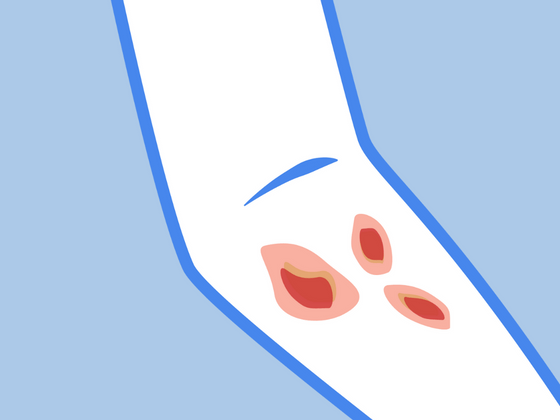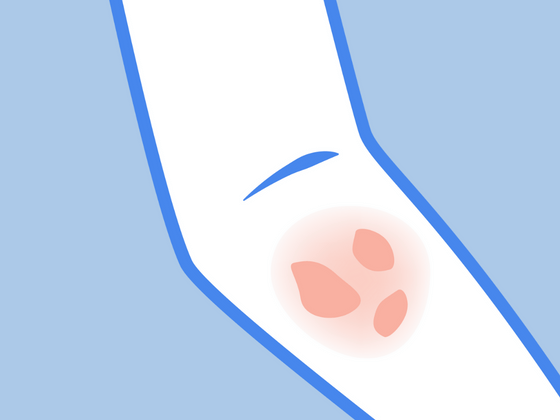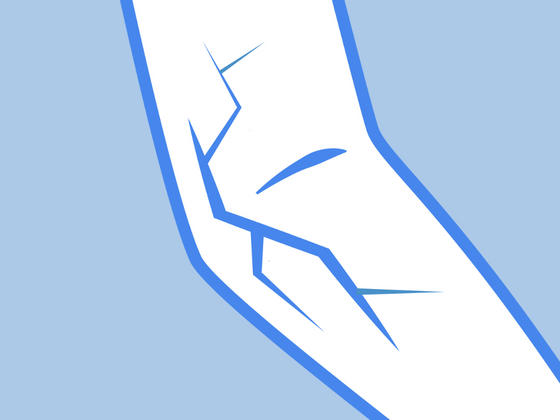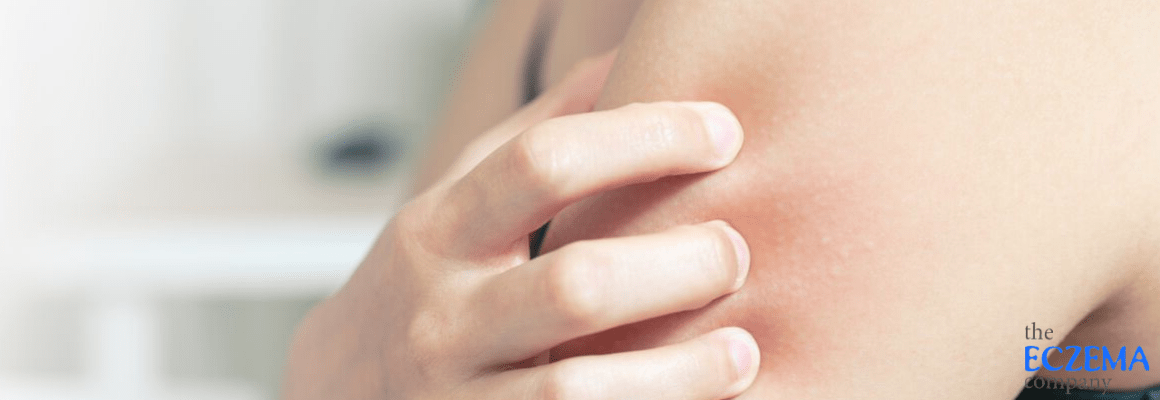In part three of our Eczema Educational Series, Eczema 103: Naturally Healing Eczema Within, we looked at different ways to heal the body from the inside out. For the fourth and final part, we’re sharing how to treat eczema naturally.
Please keep in mind that although these tips and information have worked for several sufferers, we are in no way medical professionals. If you’re experiencing severe symptoms or have a topical infection, it is always best to seek medical advice immediately.
Stop Scratching
Scratching is one of the prime discomforts to plague those suffering from eczema. The relentless urge to itch can be obsessive, leading to the opening of new wounds or worsening existing ones. Unfortunately, unbeknownst to them, many people actually scratch during the night. To stop itchy skin at night, we recommend wearing scratch protective clothing such as eczema mittens and gloves.
Remedywear™ has a selection of full body garments to not only soothe skin, but keep skin protected as well. When hands are not covered, the possibility of scratching skin relentlessly increases. All Remedywear garments are made with TENCEL and anti-inflammatory zinc fibers which have been clinically proven to improve eczema and reduce itching [1].
Our top recommendations for both adults and children are:
Remedywear Long Sleeve Shirt for Adults
Remedywear Long Sleeve Shirt for Kids
Remedywear also offers eczema gloves for both adults and children:
If you're new to eczema clothing, we suggest checking out our blog post on why eczema clothes are an important part of eczema therapy.
Avoid Harmful or Toxic Ingredients
Since healing from within requires time and patience, it may be necessary to soothe symptoms short-term by using natural skincare products.
It’s no secret that we stand by natural treatment of eczema and products that are free from harmful chemicals and toxins. Sadly, however, not all products labeled as “natural” truly are - which is why reading labels is so important. Here are some common skin irritants to watch out for:
- Alcohol of any type (too drying and can cause burning)
- Fragrance/Perfumes
- FD&C Colors and Pigments
- Petroleum
- Parabens
- Phthalates
- PEG’s
- Propylene glycol
- Phenoxyethanol
- Cocamidopropyl betaine
- Sodium benzoate
- Dimethicone
- SLS, SLES, ALES, ALS – all sulfates
In general, it's always best to avoid these ingredients in order to not further exacerbate symptoms or increase the possibility of infection.
Identify Symptoms
The best natural treatment of eczema is to identify your symptoms, rather than by the type of eczema you might be experiencing. This is because most symptoms overlap, regardless of the type of eczema.
Let’s take a closer look at some common symptoms of eczema:
Itchy/Red/Dry Eczema
As an inflammatory skin condition, eczema is caused by a damaged skin barrier that lacks moisture and is therefore identified by patches of skin that have become dry, rough, red, and extremely itchy.
Make sure to opt for natural treatments for dry eczema that are not only nourishing, but help restore skin's moisture.
Red/Weeping Eczema
Weeping eczema is usually characterized by crusty, oozing skin. Eczema treatments should target inflammation, prevent infection and soothe broken skin.
The symptoms of Topical Steroid Withdrawal (TSW) generally fall under this category. If you think you might be suffering from TSW, check out our previous post, How to Cope with Topical Steroid Withdrawal for more information.
Thick/Scaly Eczema
Over time, patches of eczema can end up thickening, resulting in an almost crocodile-like skin. Similarly to itchy, dry eczema, these type of scaly eczema requires intense hydration.
Natural Skincare Products
To treat eczema naturally, be sure to apply moisturizer at least twice a day and every time water gets in contact with your skin.
Because the skin barrier is damaged, it’s crucial to repair it topically with an emollient that rehydrates the skin and provide some wound healing abilities. Here are some of our favourite products:
Body Essentials - This natural skincare kit features our soothing Coconut and Sunflower Oil Soap and our Nourish + Hydrate Manuka Balm. This rich, creamy balm is packed with dermatologist-preferred oils, beeswax, and potent UMF®-certified Manuka honey to calm irritation, restore the skin barrier, and deliver long-lasting hydration, without ever stinging or burning. Learn more about the benefits of Manuka Honey and why you should use it on eczema here.
Grass Fed Tallow Balm - This is one of the world’s purest forms of skin care! It’s perfect for those with allergy-prone or sensitive skin and provides natural itchy skin relief.
Organic Calendula Salve - The powerful calendula flower is known for its wound healing abilities and itch relief. It certainly works wonders on dry, cracked or sensitive skin as well as eczema and psoriasis!
Dry or Wet Wrapping
Dry or wet wrapping can provide a fast-relief for itchy skin. To dry wrap, all you have to do is apply a layer of cream on the skin and follow up with a dry layer of clothing. The wrap alternative is more effective than moisturizing the skin alone because the clothing helps the cream permeate the skin and helps emollients last longer.
Wet Wrapping involves applying moisturizer and then wearing a damp piece of clothing for 2 or more hours as well as a dry layer overtop. It is a bit of extra work but the results are faster and more intense compared to dry wrapping. The dampness of the clothes helps intensify the moisturizing effect which makes it a very effective relief.
To get optimal results, we suggest using TENCEL fabric clothing made especially for wet wrapping.
Elimination Diet
If natural treatments and remedies are not able to help you, then perhaps it's time to look within. Several eczema sufferers have discovered that their eczema is triggered by a variety of food allergens like dairy, gluten, and so much more.
Learning what your triggers are is possibly one of the most important steps in treating eczema naturally.
To discover whether your eczema might be triggered by certain foods, we suggest carrying out an elimination diet. Like the name suggests, this diet consists of removing certain foods from your diet for a certain period of time and then reintroducing them one at a time to study a reaction. Don't get us wrong - elimination diets can be difficult (especially for children), but the trade-off is pinpointing your exact triggers and possibility reducing your eczema symptoms considerably.
No matter where you are in your journey, and regardless of whether you are a caregiver or suffering from eczema yourself, please know that you are not alone. Eczema does not define you! We know that dealing with eczema can be stressful and emotional but you do not need to suffer in silence. The National Eczema Association has an online support group that is a great resource. Finally, remember that seeking help from a therapist or psychologist to improve your mental health is just as important as visiting a doctor to take care of your physical health.
That’s a wrap! We hope you enjoyed our four-part Eczema Educational Series. If you missed any along the way, be sure to check them out and let us know if you have any questions!
Did you miss any part of the series?
Eczema 102: What Triggers Eczema?
Eczema 103: Naturally Healing Eczema From Within


Bio: Laura is a contributor and content developer for The Eczema Company. She is in no way a medical professional. Her comments, suggestions, and reflections are not intended to replace any medical advice. Always seek the help of a medical professional before undertaking any diet or lifestyle changes.








